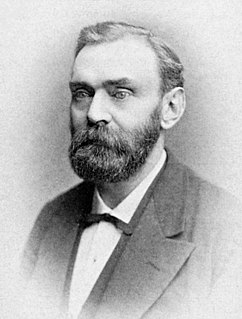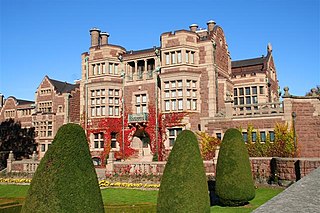


Övralid is a manor house located north of Motala in Östergötland County, Sweden. [1]



Övralid is a manor house located north of Motala in Östergötland County, Sweden. [1]
Övralid was erected between 1923 and 1925 by poet, writer, and Nobel Prize laureate Verner von Heidenstam (1859–1940). He was awarded the Nobel Prize in Literature in 1916. [2] [3]
Övralid was built on the east hillside of lake Vättern. The main building is a white-plastered wooden building on two floors. Övralid houses a library, a study, a dining hall, two bed rooms, and three guest rooms. The interior has been kept the way it was when Heidenstam died in 1940. The building is shown with guided tours in the summer and the personal belongings of Heidenstam can be seen where he left them at the time of his death. Heidenstam was buried in a tomb on the estate. [4] [5]
After Heidenstam's death, the original large land area was sold off. Today the manor is operated as a museum by the Övralid Foundation (Övralidsstiftelsen) which was founded in accordance with Heidenstam's will. The foundation also awards the Övralidspriset literary award on an annual basis. [6]

Alfred Bernhard Nobel was a Swedish chemist, engineer, inventor, businessman, and philanthropist. He is best known for having bequeathed his fortune to establish the Nobel Prize, though he also made several important contributions to science, holding 355 patents in his lifetime. Nobel's most famous invention was dynamite, a safer and easier means of harnessing the explosive power of nitroglycerin; it was patented in 1867 and was soon used worldwide for mining and infrastructure development.

The Nobel Prizes are five separate prizes that, according to Alfred Nobel's will of 1895, are awarded to "those who, during the preceding year, have conferred the greatest benefit to Mankind." Alfred Nobel was a Swedish chemist, engineer, and industrialist most famously known for the invention of dynamite. He died in 1896. In his will, he bequeathed all of his "remaining realisable assets" to be used to establish five prizes which became known as "Nobel Prizes." Nobel Prizes were first awarded in 1901.

The Nobel Prize in Physiology or Medicine is awarded yearly by the Nobel Assembly at the Karolinska Institute for outstanding discoveries in physiology or medicine. The Nobel Prize is not a single prize, but five separate prizes that, according to Alfred Nobel's 1895 will, are awarded "to those who, during the preceding year, have conferred the greatest benefit to humankind". Nobel Prizes are awarded in the fields of Physics, Chemistry, Physiology or Medicine, Literature, and Peace.

Carl Gustaf Verner von Heidenstam was a Swedish poet, novelist and laureate of the Nobel Prize in Literature in 1916. He was a member of the Swedish Academy from 1912. His poems and prose work are filled with a great joy of life, sometimes imbued with a love of Swedish history and scenery, particularly its physical aspects.

The Right Livelihood Award is an international award to "honour and support those offering practical and exemplary answers to the most urgent challenges facing us today." The prize was established in 1980 by German-Swedish philanthropist Jakob von Uexkull, and is presented annually in early December. An international jury, invited by the five regular Right Livelihood Award board members, decides the awards in such fields as environmental protection, human rights, sustainable development, health, education, and peace. The prize money is shared among the winners, usually numbering four, and is €200,000. Very often one of the four laureates receives an honorary award, which means that the other three share the prize money.

Stockholm City Hall is the seat of Stockholm Municipality in Stockholm, Sweden. It stands on the eastern tip of Kungsholmen island, next to Riddarfjärden's northern shore and facing the islands of Riddarholmen and Södermalm. It houses offices and conference rooms as well as ceremonial halls. It is the venue of the Nobel Prize banquet and is one of Stockholm's major tourist attractions.

Goethe University is a university located in Frankfurt am Main, Germany. It was founded in 1914 as a citizens' university, which means it was founded and funded by the wealthy and active liberal citizenry of Frankfurt. The original name was Universität Frankfurt am Main. In 1932, the university's name was extended in honour of one of the most famous native sons of Frankfurt, the poet, philosopher and writer/dramatist Johann Wolfgang von Goethe. The university currently has around 45,000 students, distributed across four major campuses within the city.
Scandinavian literature or Nordic literature is the literature in the languages of the Nordic countries of Northern Europe. The Nordic countries include Denmark, Finland, Iceland, Norway, Sweden, and Scandinavia's associated autonomous territories. The majority of these nations and regions use North Germanic languages. Although majority of Finns speak Uralic languages, Finnish history and literature are clearly interrelated with those of both Sweden and Norway who have shared control of various areas and who have substantial Sami populations/influences.
Swedish realism is the period in Swedish literature that encompassed the last two decades of the 19th century. It is generally considered to have ended in the 1910s but the exact year is a matter of debate.
Katedralskolan is a school in Uppsala, Sweden. The school was established in 1246. It is the oldest educational institution in Uppsala, and one of the oldest in Sweden.

The Goethe-Medaille für Kunst und Wissenschaft is a German award. It was authorized by Reichspräsident Paul von Hindenburg to commemorate the centenary of Johann Wolfgang von Goethe's death on March 22, 1932. It consists of a silver, non-wearable medal.

The Nobel Prize in Literature is a Swedish literature prize that is awarded annually, since 1901, to an author from any country who has, in the words of the will of Swedish industrialist Alfred Nobel, "in the field of literature, produced the most outstanding work in an idealistic direction". Though individual works are sometimes cited as being particularly noteworthy, the award is based on an author's body of work as a whole. The Swedish Academy decides who, if anyone, will receive the prize. The academy announces the name of the laureate in early October. It is one of the five Nobel Prizes established by the will of Alfred Nobel in 1895. Literature is traditionally the final award presented at the Nobel Prize ceremony. On some occasions the award has been postponed to the following year, most recently in 2018.

Noor palace is a 14th-century mansion in Knivsta, Sweden.

Tjolöholm Castle is a country house in Halland, Sweden. It is located on a peninsula in the Kungsbacka Fjord on the Kattegat coast. The manor house was designed by architect Lars Israel Wahlman (1870–1952) in a style inspired by Tudor architecture and built between 1898 and 1904.

Nils Gustav von Heidenstam was a Swedish engineer born in Blekinge. He was the chief engineer of the Swedish Royal Coast Guard.

Mårbacka is a manor house in Sunne Municipality in Värmland, Sweden. The author Selma Lagerlöf was born and raised at Mårbacka.

Events from the year 1859 in Sweden
Per I. Gedin is a Swedish publisher and writer.
| Wikimedia Commons has media related to Övralid . |
Coordinates: 58°36.454′N14°56.648′E / 58.607567°N 14.944133°E